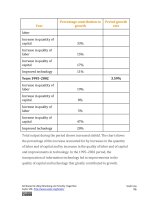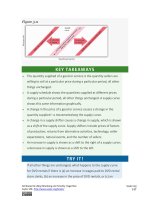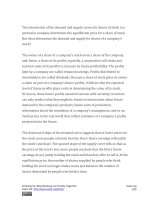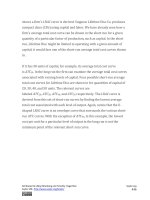Authors libby rittenberg 870
Bạn đang xem bản rút gọn của tài liệu. Xem và tải ngay bản đầy đủ của tài liệu tại đây (414.51 KB, 1 trang )
There are often very good reasons behind consumer protection regulation,
and many economists accept such regulation as a legitimate role and
function of government agencies. But there are costs as well as benefits to
consumer protection.
The Benefits of Consumer Protection
Consumer protection laws are generally based on one of two conceptual
arguments. The first holds that consumers do not always know what is
best for them. This is the view underlying government efforts to encourage
the use of merit goods and discourage the use of demerit goods. The
second suggests that consumers simply do not have sufficient information
to make appropriate choices.
Laws prohibiting the use of certain products are generally based on the
presumption that not all consumers make appropriate choices. Drugs such
as cocaine and heroin are illegal for this reason. Children are barred from
using products such as cigarettes and alcohol on grounds they are
incapable of making choices in their own best interest.
Other regulations presume that consumers are rational but may not have
adequate information to make choices. Rather than expect consumers to
determine whether a particular prescription drug is safe and effective, for
example, federal regulations require the Food and Drug Administration to
make that determination for them.
The benefit of consumer protection occurs when consumers are prevented
from making choices they would regret if they had more information. A
consumer who purchases a drug that proves ineffective or possibly even
Attributed to Libby Rittenberg and Timothy Tregarthen
Saylor URL: />
Saylor.org
870









